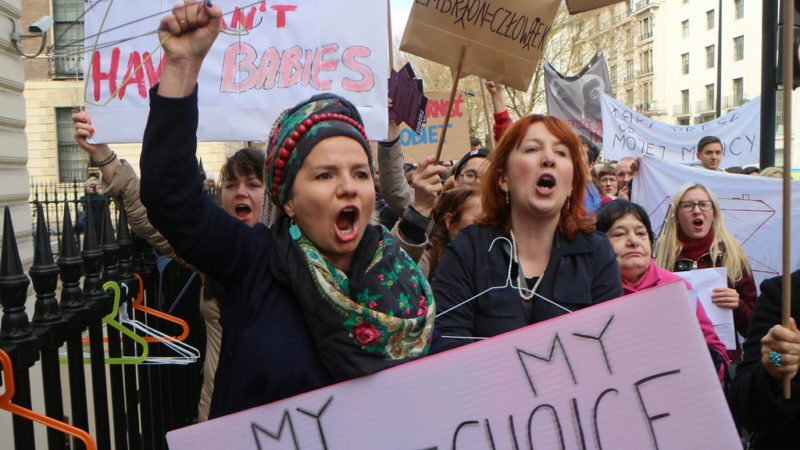For many, many women, having an abortion is the toughest decision they will ever have to make. Imagine the distress and trauma that is added to that when they are confronted by those using intimidation and fear tactics to pressure them to reconsider.

The Home Secretary has rejected calls for buffer zones outside abortion clinics. His decision could be the result of indifference. Or it could be a failure to understand the severity of women’s experiences at the hands of anti-choice campaigners, intimidating and harassing them in their most vulnerable moment. What is clear, is that in ruling against buffer zones he has renounced his duty, and that of the Government, to uphold women’s rights.
For many, many women, having an abortion is the toughest decision they will ever have to make. Imagine the distress and trauma that is added to that when they are confronted by those using intimidation and fear tactics to pressure them to reconsider. To pressure them into relinquishing their legal right to an abortion, to ignore their own needs and resist their right to make their own decisions about their own bodies. Buffer zones – protest-free areas outside abortion clinics – would inhibit any such barbaric activity. The very fact that the Government can acknowledge that women are being harassed and in the same breath refuse to act is baffling.
The hugely disappointing decision by the Home Secretary to rule against the widespread introduction of buffer zones is made all the more worse by his reasoning. In a statement accompanying his decision, Sajid Javid said it “would not be a proportionate response”. I have real difficulty with the use of the word ‘proportionate’ in this situation, because it puts an arbitrary value on human emotions and on women’s reproductive rights. It represents a failure to gage the level of impact that being shown graphic images and model foetuses, having their path blocked and even being assaulted – as the Home Office’s own review reports – has on the emotional wellbeing of those women. Even one woman who is obstructed, either through physical or emotional force, from exercising her legal right is one too many. In fact, the Government’s review suggests the number is far, far higher, with approximately one in ten clinics reporting incidents against their patients or staff.
Proportionality also has no place in this decision because our human rights have universal application. There is no hierarchy of human rights. Women have the right to have their privacy protected, the right to protection from discrimination, the right to liberty and security. All of those rights are equal, and all should be protected.
Another part of the Home Secretary’s reasoning was that powers already exist under the Public Order Act 1986 which includes Public Space Protection Orders (PSPO). Only last year the London Assembly asked the Mayor of London to clarify the powers that the Metropolitan Police Service have on these issues, and it was revealed that despite the Home Secretary’s claims, it is far from clear how PSPOs are enforced.
It was under this legislation that Ealing Council, this year, were able to create a buffer zone around a Marie Stopes clinic in their borough. Yet their experience demonstrated that implementing a PSPO is far from simple. Indeed, Ealing Council had to go through an extensive and expensive process, including defending their decision in the High Court to get the buffer zone in place and are still facing the prospect of an appeal.
The danger is that processes like this, in which councils seeking to protect people accessing these services are forced to jump through hoop after hoop, can act as a deterrent to other councils, particularly amongst those with less capacity or will to follow suit. Is really right that councils, who are already being forced to make difficult decisions on funding priorities and local services, should also have to bear the responsibility and costs of dealing with what is a national issue? This will undoubtedly lead to patchy provision in which only some women are given the protection to which they are entitled, whilst others remain exposed to the harassment of some in the anti-choice lobby.
It is in no way proportionate that women using a clinic in Ealing gets protection but those in other places don’t. It is in no way proportionate that women can continue to be subjected to harassment and intimidation in an area where the local authority has not used the Public Order Act to protect them. And it is in no way proportionate that the human rights of women in this country, who wish to access a service to which they are legally entitled, are set aside to protect the liberties of those who chose to object to them exercising that entitlement.
The Home Secretary must reconsider.
Fiona Twycross is a Labour London Assembly member. Follow her on Twitter
Left Foot Forward doesn't have the backing of big business or billionaires. We rely on the kind and generous support of ordinary people like you.
You can support hard-hitting journalism that holds the right to account, provides a forum for debate among progressives, and covers the stories the rest of the media ignore. Donate today.



